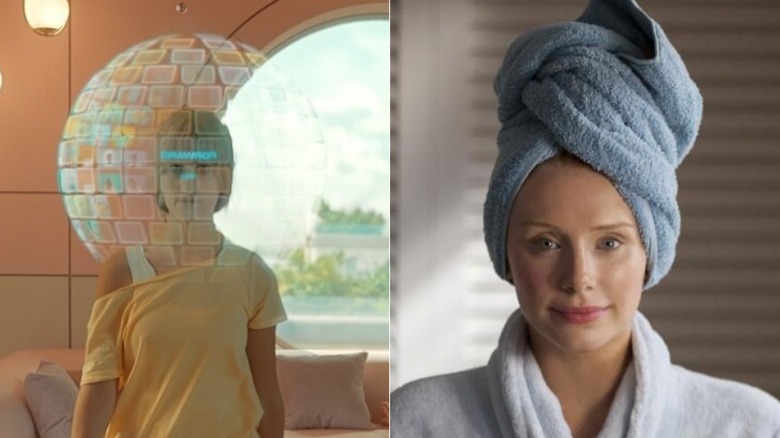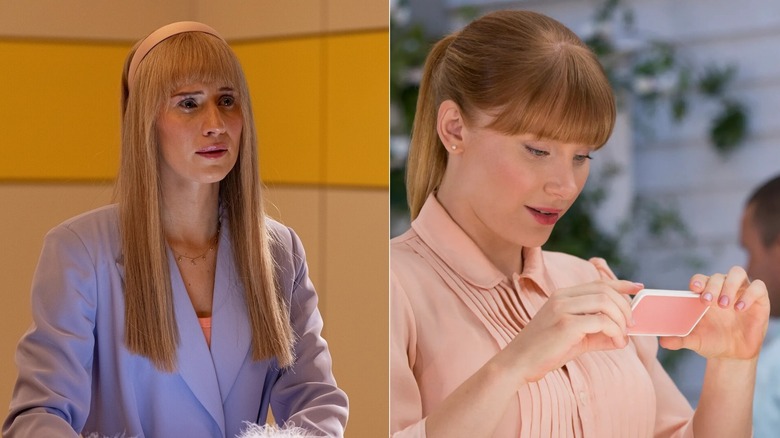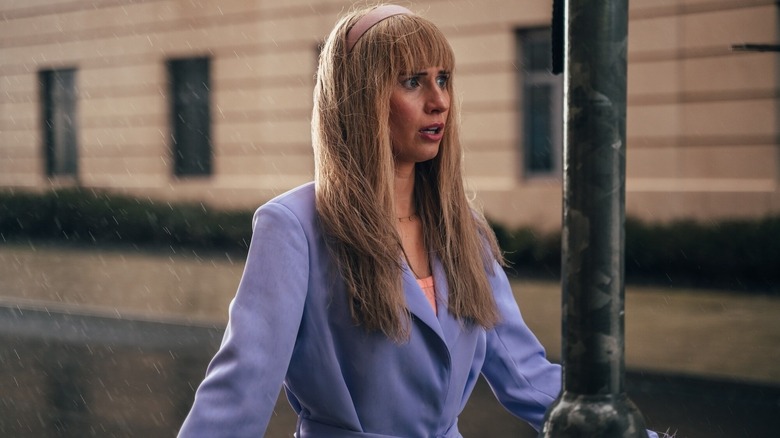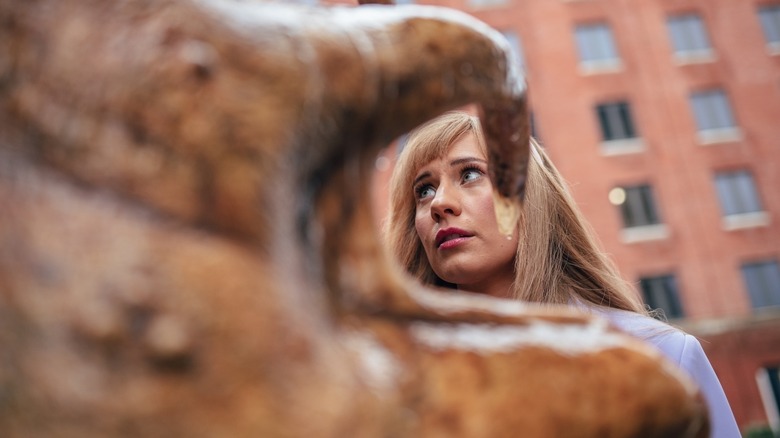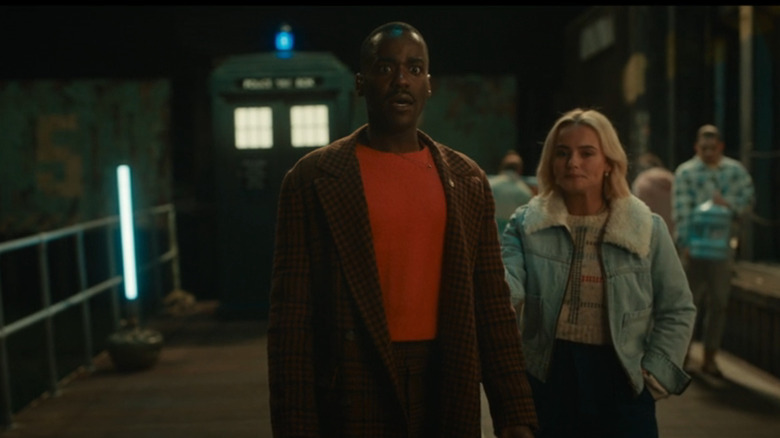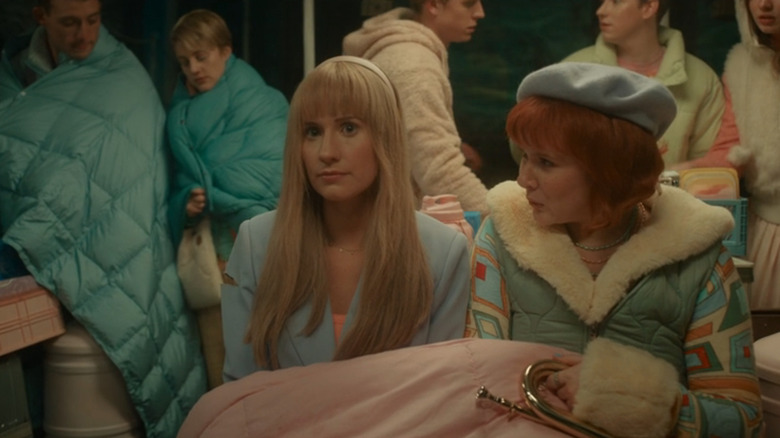Doctor Who's Bleak New Episode Took A Page From Netflix's Darkest Show
Spoilers below for both "Doctor Who" and "Black Mirror."
In a recent interview about the latest "Doctor Who" episode, showrunner Russell T. Davies teased that the show would "step into 'Black Mirror' territory." It turns out that Davies is a big fan of the dystopian anthology series and its creator, Charlie Brooker. But even as his latest episode took inspiration from the show, he promised it'd still have that "Doctor Who" spin:
"[Brooker's] immensely brilliant. But there's a little bit more freedom and 'Doctor Who' madness in 'Dot and Bubble'. There's a sense of fun. And monsters in the middle of it... So although it's 'Black Mirror'-like, it's more 'Doctor Who.' ['Dot and Bubble']'s got the bones and the blood of our favourite show."
Sure enough, the latest episode of season 14 is clearly based off of "Nosedive." That's a famous season 3 "Black Mirror" episode, centered around a woman whose every action has been dictated by an all-encompassing social media app where everyone constantly rates each other from one to five stars. There's no rating system in "Dot and Bubble," but the episode keeps the former episode's pastel, artificial color scheme, as well as the basic premise of a woman who's grown so used to a pervasive social media system that she can barely function as a regular human being.
The one thing Davies was wrong about, however, is the idea that "Dot and Bubble" has a stronger sense of fun behind it. Although the episode mines a ton of humor over its helpless, self-centered protagonist, it's still a miserable affair compared to "Nosedive." "Black Mirror" might be famous for its ability to invoke true despair into its viewers, but when it comes to critiquing social media, this latest "Doctor Who" installment is even bleaker.
Doctor Who's Lindy: an absurdly unlikable character
The main character in "Nosedive," Lacie (Bryce Dallas Howard), is a likeable character. Even though she starts off as another fake, social media-obsessed drone, she's quickly confronted with the miserable reality of her situation. The series of bad interactions she goes through make her increasingly sympathetic, and as oppressive as this world is, it's thrilling to watch Lacie grow bolder and more independent. It's cathartic to watch her ruin her shallow friend's wedding, consequences be damned. She may end up in prison at the end, but as she's enjoying an insult contest with her new cellmate, it's clear that she's the happiest she's ever been.
The main character in "Dot and Bubble," Lindy (Callie Cooke), is given no such arc. Her dependency on her "Bubble," the social media app that covers her view of everything around her and instructs her on what to do every second of the day, is so strong that she can't even walk without it. Lindy is utterly useless for the entire first half of the episode, and when she does finally figure out how to function in the real world, she goes about it in a cold, selfish way. Her survival is ensured by betraying Ricky (Tom Rhys Harries), the only Finetime inhabitant whose brain hasn't been rotted to the core, and she doesn't express any guilt over getting him killed. Even at the end, she's going along with the other Finetime residents' suicidal mission to "The Great Beyond," obliviously rejecting the Doctor's urgent offer to save her life.
Unlike "Nosedive," this is not a story about rejecting the lies of her world and embracing truth. It's a story about how social media can warp people's brains to the point of no return.
A surprisingly mean episode of Doctor Who
Lindy isn't supposed to be a likeable character. At best she inspires pity, but usually she's frustrating and annoying. Most of all, she's supposed to be funny. One of the biggest laughs of the episode is when the Doctor responds incredulously, "You forgot how to walk?" when Lindy first freezes up. Both the Doctor and Ruby are very patient with her throughout the episode, so the moments where they give that "oh, for god's sake" reaction are delightful.
But most of the comedy feels like we're supposed to sneer at Lindy, as she constantly moans about wanting to stay inside her bubble. She repeatedly snaps at the Doctor and Ruby, declaring how she's "not a child" even as she doesn't know how to do anything for herself. The people of Finetime are spoiled, rude, sheltered, and close-minded; they're a cartoonish depiction of what social media addiction can turn you into.
It might seem like an odd choice, given how "Doctor Who" is typically home to rousing speeches about the inherent beauty and kindness of the human race. But showrunner Russell T. Davies, perhaps more so than any of the other two revival "Who" showrunners, has always had a cynical edge. Season 4's "Midnight," for instance, ended on a similar note of the Doctor being disillusioned with human nature. A lot of the characters in that episode were infuriating, and even most of the characters we did like still disappointed us.
"Dot and Bubble," however, feels too judgmental for its own good. Whereas "Midnight" invited us to reflect on our own selfish instincts, this episode feels like it wants us to gawk and laugh at this helpless town of idiots. Nowhere in "Nosedive" did "Black Mirror" ever seem to hold Lacie to this level of contempt.
Dot and Bubble isn't wrong, but it is annoying
Admittedly, we're all familiar by this point with people who are almost debilitatingly obsessed with their phones, who spend so much time online that they end up sounding unhinged when talking with regular people face-to-face. The belief that the internet's making people ruder and more resistant to opposing points of view is a common one. The finale with the Finetime residents walking themselves into certain doom (as the Doctor tries in vain to change their minds) feels like a poignant metaphor for anyone who's ever tried to stop a friend or family member from falling down an extremist internet rabbit hole.
The Doctor's outburst, with Ruby tearing up beside him, is one of the most powerful (and well-acted) moments of the season so far. Whether that makes up for the forty minutes of frustration that preceded it, however, will likely vary from viewer to viewer.
What's most surprising is that usually it's the "Black Mirror" writers who struggle to beat the "too cynical!" allegations, yet "Nosedive" was the show's first proper venture into genuinely celebrating the human spirit. Even though Lacie was brainwashed into embracing a world where everyone's social ratings decided their whole lives, she was still capable of pushing forward, changing her mind, and finding herself in the process. "Doctor Who" gives us no such comfort. It leaves us with the warning that maybe the poisonous effect of social media will be the thing that kills us, that there's no undoing its damage at this point even if we turn all the apps off. I don't think "Dot and Bubble" is as brilliant as any of the peak "Black Mirror" episodes, but in terms of sheer darkness, it definitely holds its own.
The episode's biggest twist: Finetime is racist
One of the smartest thing "Dot and Bubble" does, however, was add an undercurrent of racism to Lindy and Finetime's behavior. Throughout the episode, Lindy's significantly ruder to the Doctor than she is to Ruby. When she does start doing as the Doctor asks, she begrudgingly tells her friends that "he's not as stupid as he looks." Most of this behavior could be explained by all the aspects of Lindy we've covered so far. At first I figured she was ruder to the Doctor because he was the first one to warn her that something was wrong. Even when she was saying he looked stupid, I assumed that was just another case of her lashing out at both he and Ruby for her stressful situation.
It's only at the end that the significance of these remarks (not to mention the fact that everyone in Finetime is white) becomes hard to overlook. Lindy in the final scene rejects the Doctor's request to save her not just out of an oblivious desire to conquer another land with her fellow Finetime residents (good luck with that!), but because the Doctor is Black and she would never be in the same room as him. (It turns out that Lindy's shock at Ruby and the Doctor being in the same room earlier was more than just regular anti-social behavior.)
It's one of the first times the Fifteenth Doctor's race is directly addressed on this show, and boy is it upsetting. I've always assumed that if "Doctor Who" were to have the new Doctor be the victim of racism, it'd have the episode set in the past. Setting this story in the future makes it even bleaker.
That final twist improved everything
"Dot and Bubble" is still a miserable, frustrating affair, but I do have to hand it to RTD for adding that extra level of social commentary into this story, elevating it to something far more complicated and compelling. "Nosedive" barely touched on racism at all, but RTD used the more obvious "phones bad" subtext of its premise to weave the issue in, most subtly than he's handled any of his social messaging so far. It's a messed up twist-on-top-of-a-twist, one that retroactively justifies so much of the episode's contempt towards Lacey.
Most notably, the racism helps to clarify a lot of the episode's social commentary, narrowing it down from a broad "old man yells at cloud" vibe to something more clearly focused on right-wing, white nationalist echo chambers. What initially sort of presented itself as a standard conservative story about how young people are too coddled and lazy revealed itself as a story about how racism is inherently self-destructive.
It's reminiscent of another "Black Mirror" episode, "White Bear." That season 2 episode also started off as a seemingly generic "phones bad, right?" story, before revealing it had a ton to say about retributive justice and the way memory and identity link together. "Dot and Bubble" might've seemed like a clumsier, more frustrating version of a typical "Black Mirror" installment, but with that final twist RTD revealed that he could very much hold his own.
